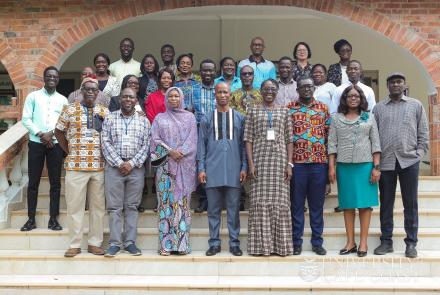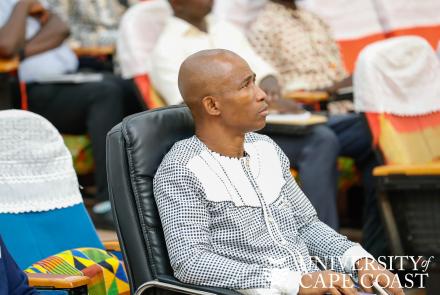The Provost of the College of Health and Allied Sciences (CoHAS), to achieve the mandate of promoting multi-and transdisciplinary research, constituted a sub-committee to plan for the establishment of a Biomedical and Clinical Research Centre for the College. The plan for implementation was aimed at enhancing the research portfolio of the College and the University at large. It was to position the College as a key stakeholder in the provision of total care solutions for the double burden diseases confronting our nation and Africa as a whole . The committee tasked with this responsibility was the Committee for Research, Scholarship, Grants, and Laboratory Management (CoRSGLaM).
CoRSGLaM is made up of five members from the three Schools (do you want to name the schools and do you know the year it was established) within the College, with a co-opted secretary from the School of Health and Allied Sciences (SAHS). As part of its core decisions concerning its overall mandate and specifically to enhance the implementation process of the Research Centre, the Committee directed special attention to the under listed terms of reference:
-
Review and finalize the draft 2015 Concept Paper on the Research Centre for approval by the College Board and onward submission to the Academic Board.
-
Liaise with Directorate of Research, Innovation, and Consultancy (DRIC) in the development of a policy document for the Research Centre
-
Collect data on individual and departmental academic research themes and interests
-
Create a database of research works and themes of faculty members and departments
-
Conduct a familiarization tour of existing research facilities in the College to assess their current state and propose modifications and alterations for possible upgrade into a Research Centre
-
Seek collaborative partners to support the establishment and construction of the Research Centre
CoRSGLaM at its meetings held from November 2017 to April, 2018 deliberated on the above terms of reference and consequently conducted a review of the Concept Paper for the establishment of the Research Centre. The paper was written by a ten (10) man Committee chaired by Prof. Martins Ekor in 2015. Both committees agreed on the need for a dedicated Research Centre to coordinate financial and material resources for enhancing
- research promotion and capacity building,
- research integration of the various schools,
- postgraduate training and strategic workshops for the College.
- Therefore, towards the planning and establishment of the College Research Centre, CoRSGLaM proposed the following short to long term steps.
Review best international research centre practices with the view to adopting an appropriate model for the development of the UCC CoHAS Biomedical and Clinical Research Centre (hereafter referred to as the Research Centre).
-
Identify existing structures that could be reverted into the Research Centre while the building of the substantive Research Centre is developed
-
Source funds to upgrade identified temporary facilities until the substantive Research Centre is built.
-
Develop a detailed human resource plan for the management of the Research Centre
-
Appoint a Director and skeletal staff to kick-start the Research Centre
-
Develop postgraduate programmes in health sciences to be run by the Research Center
-
This report, an amalgamation of the 2015 concept paper and CoRSGLaM’s deliberations is hereby submitted for your consideration and further action.
The establishment of the Centre for Biomedical and Clinical Research was timely and appropriate to promote the realization of the Sustainable Development Goal 3 (SDG-3) of ensuring healthy lives and wellbeing for all at all ages. Similarly, the Research centre will ensure translation of basic scientific research output from the bench to bedside through development of affordable medicines and therapies. The creation of the Research centre will thus provide the impetus of finding solutions to problems bedeviling the health sector which fits into the long term strategic plan of the government of Ghana in building an equitable, healthy and a prosperous society (NDPC, 2018).
Kumasi Centre for Collaborative Research (KCCR) in Kwame Nkrumah University of Science and Technology (KNUST) and Noguchi Memorial Institute for Medical Research (NMIMR) in University of Ghana (UG) have focused primarily on infectious diseases and tropical medicine. However, with the double burden of diseases which Africa and particularly Ghana is confronted with, there is the need to diversify the scope of research with emphasis on non-communicable diseases without reneging on the fight against infectious diseases. However, with the adoption of Western lifestyle and diets in Ghana and Africa on the whole, there has been an increase in non-communicable diseases such as diabetes, hypertension and other cardiovascular diseases. This is now becoming a major public health concern as 77% of deaths in LMIC are directly linked to NCD. More concerning is also the increasing incidence of childhood obesity. It is in this light that CoHAS intends to position itself through the establishment of a research centre to tackle this menace as NCS threaten the progress towards achieving the aims of 2030 Agenda for Sustainable Development which focuses primarily on reducing deaths from NCDs.
Vision Statement
To be a centre for basic, applied, and translational research in biomedical and clinical sciencesMission Statement
- Our mission is built on a strong institutional, national, regional, and international model that can harness optimal scientific and technological opportunities to achieve the following landmarks:
- Produce the best research output with outstanding quality and make it universally available for positive health prosperity.
- Provide a dynamic research environment to promote interdisciplinary and innovative research in biomedical and clinical to impact global health.
- Collaborate with industries and research institutes across the globe to build and strengthen the strategic operational capabilities for maintaining demand driven research
Goal
To develop career scientists who will promote biomedical, clinical and translational research through transdisciplinary collaborative projects for innovative healthcare solutionsThe Objective of the Centre is to
- be the focal point to provide the platform for all research-related activities within the College and with other sister Centres.
- engage in transdisciplinary research to translate findings into innovative healthcare solutions that can be adopted and replicated within the sub-region.
- encourage initiatives for research support, grant acquisition, and to maintain cutting-edge research in biomedical and clinical sciences.
- make accessible state-of-the-art facilities for applied and translational research for national development.
- disseminate research findings to the scientific and receptive community through peer-reviewed journals, conference proceedings, workshops, professional development programmes and public engagements.
- promote the patenting of new knowledge and discoveries that improve patient outcomes in areas of disease prevention, diagnostics and therapeutic interventions.



